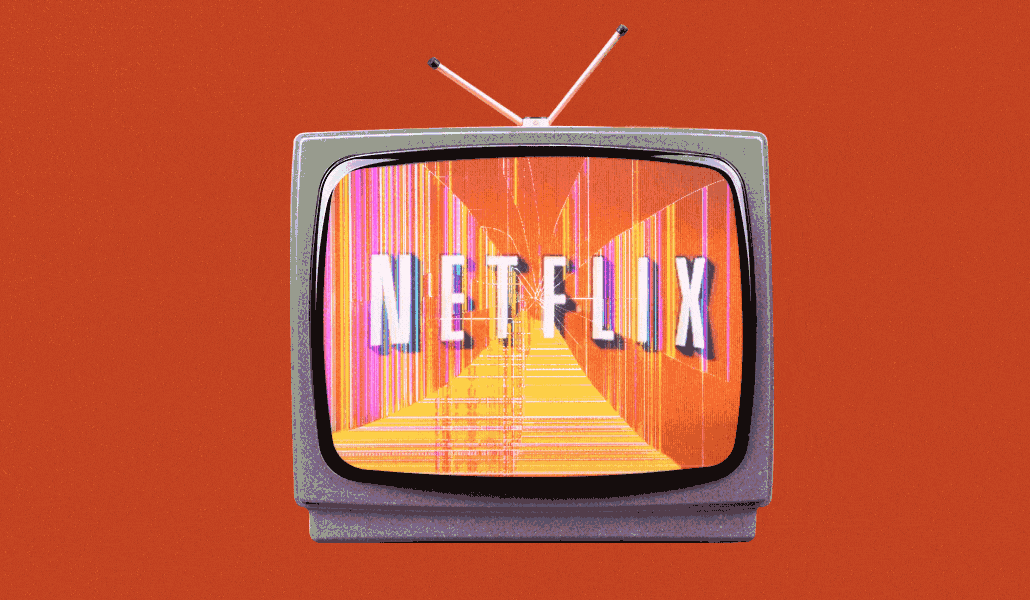In the realm of entertainment, few names have left as profound a mark as Netflix. As an industry disruptor and a pioneer of the streaming revolution, Netflix has redefined the way we consume and experience television shows, movies, and original content. Founded in 1997 by Reed Hastings and Marc Randolph, the company began as a DVD rental-by-mail service, but its journey would lead it to become a global streaming powerhouse, forever altering the landscape of the entertainment industry.
Netflix is an American subscription video on-demand over-the-top streaming service. It provides a library of films and television series produced by Netflix, as well as licensed content. Netflix is available in over 190 countries and territories and has over 238 million paid memberships as of the second quarter of 2023. Most Netflix subscribers are based in the EMEA region (Europe, Middle East, and Africa), accounting for almost 80 million of Netflix’s total global subscriber base.
Netflix was founded in 1997 by Reed Hastings and Marc Randolph. The company started as a DVD-by-mail rental service, but it pivoted to streaming in 2007. Netflix has since become the world’s leading streaming service, with a wide variety of content to choose from.
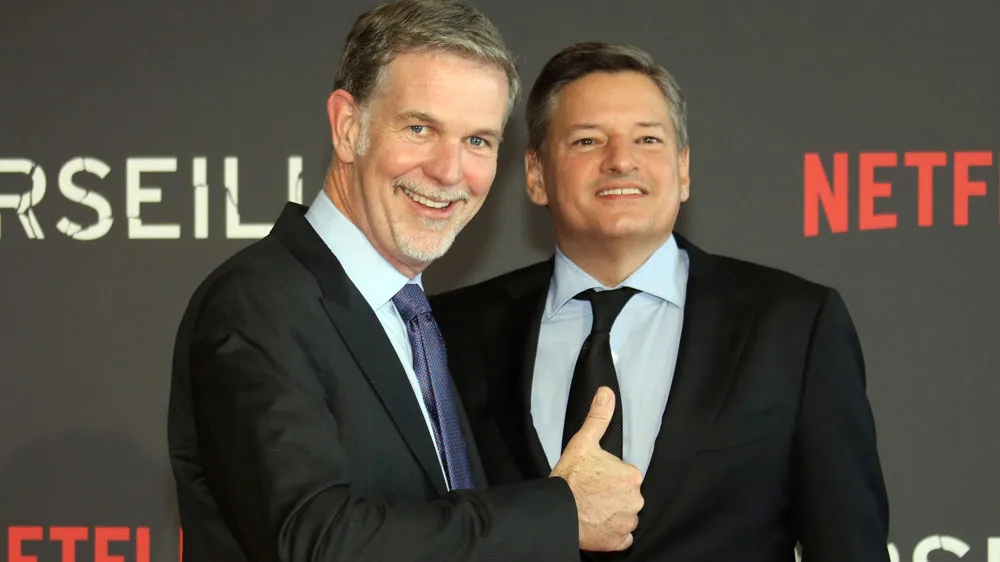
Netflix’s original content is some of the most popular on the service. The company has produced award-winning shows like “Stranger Things”, “The Crown”, and “The Witcher”. Netflix also has a large library of licensed content, including popular TV shows and movies like “The Office”, “Friends”, and “The Shawshank Redemption”.
Netflix is a popular streaming service for people of all ages. The service offers a variety of features to make it easy to find and watch content, including personalized recommendations, parental controls, and offline viewing. Netflix is also available on a variety of devices, including smartphones, tablets, computers, and smart TVs.
Netflix is a subscription-based service, which means that users pay a monthly fee to access the content. The cost of a Netflix subscription varies depending on the plan and the country. Netflix offers a free trial for new users, so you can try the service before you commit to a subscription. However, due to losses in its susbcriber base recorded in the first half of 2022, Netflix introduced an ad-supported tier in November 2022 to offset customer and revenue declines. Furthermore, while the subscription revenue of the streaming provider is expected to decline in the years to come, the advertising revenue is forecast to increase, showing the high value of hybrid business models to the streaming market these days.
Netflix is a major player in the streaming industry and it is constantly innovating. The company is investing heavily in original content and it is expanding its international reach. The company’s commitment to producing original and diverse content, combined with its technological prowess, positions it as a dominant force in the entertainment industry. While the future remains uncertain, one thing is clear: Netflix’s influence on how we watch and engage with content will continue to shape the entertainment landscape for years to come.
Netflix Marketing Strategies
In the world of entertainment today, Netflix has become a leader and a game-changer, changing the way we watch shows and movies. This success is thanks to some smart plans they made to tell people about their content and make it special for each person. They’ve become a big part of the streaming revolution, and we’ll tell you more about how they did it. They’ve been really clever in how they talk about their shows and movies, and they use information about what you like to make your experience better. Let’s dive into the details of how Netflix became so famous with their marketing strategies.
Original Content as a Marketing Engine:
Netflix invests heavily in producing original programming that caters to diverse interests and cultures worldwide. With hit shows such as “Stranger Things,” “The Crown,” “Ozark,” and “Narcos,” they aim to capture global viewership. By creating award-winning TV series, movies, documentaries, and specials, Netflix ensures there’s something for everyone.
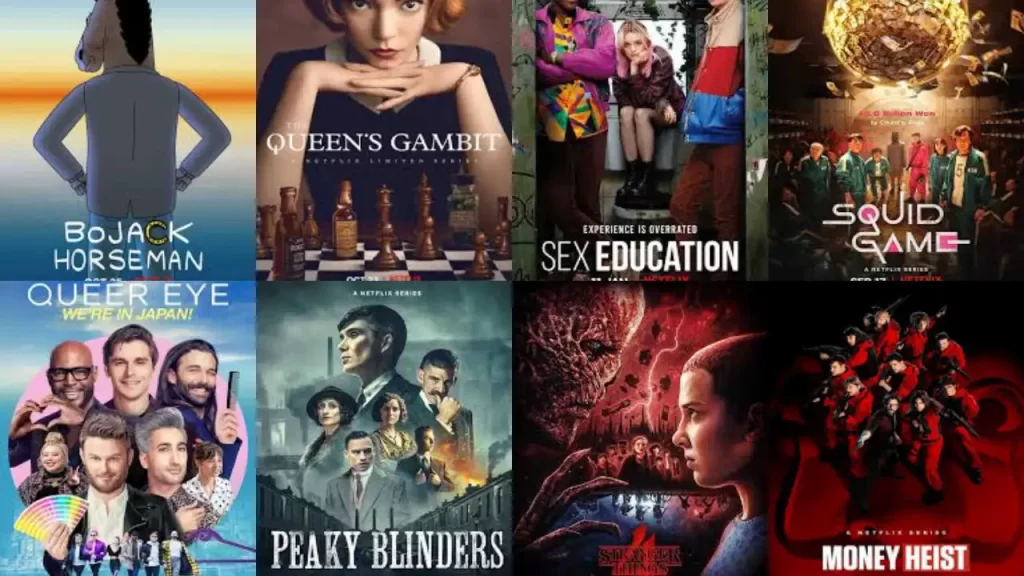
Netflix capitalizes on social media to promote their original content and interact with fans. They regularly share teasers, trailers, behind-the-scenes footage, and cast interviews on Instagram, Twitter, Facebook, TikTok, and YouTube. By fostering online buzz around new releases, they encourage subscribers to watch and discuss their latest productions.
Netflix incorporates cross-promotion within their platform by recommending related titles to users based on their viewing history. When members finish watching a season or movie, they receive suggestions for similar original content available exclusively on Netflix. This not only keeps subscribers engaged but also encourages discovery of lesser-known programs.
By partnering with renowned actors, directors, writers, and production companies, Netflix associates themselves with top-notch creators who bring fresh ideas and star power to their projects. Collaborating with household names like David Attenborough, Barack Obama, Beyoncé, and Drake expands their reach beyond traditional entertainment circles.
Prominent figures like Chrissy Teigen, Karlie Kloss, and Lilly Singh share their favorite shows and films with millions of followers, further amplifying the impact of Netflix’s marketing efforts.
Netflix’s original content creation serves as a prime example of how a company can leverage its strengths to disrupt traditional industries and shape consumer behavior. While challenges remain ahead, Netflix seems well-positioned to continue leading the charge in redefining the future of entertainment.
Data-Driven Personalization and Recommendation Engine:
The core of Netflix’s product lies in its recommendation algorithms. These algorithms serve the purpose of offering personalized suggestions to members, effectively reducing the time and effort needed to discover high-quality content for viewing.
Given the pivotal role that recommendations play, the company is consistently dedicated to enhancing them by pushing the boundaries of advancements in this field. This commitment is underpinned by the utilization of data pertaining to members’ viewing habits, content preferences, and interaction patterns with the platform.
To achieve this, Netflix goes beyond merely validating ideas based on historical data. The company delves into understanding the real-time responses of users to alterations within the recommendation system.
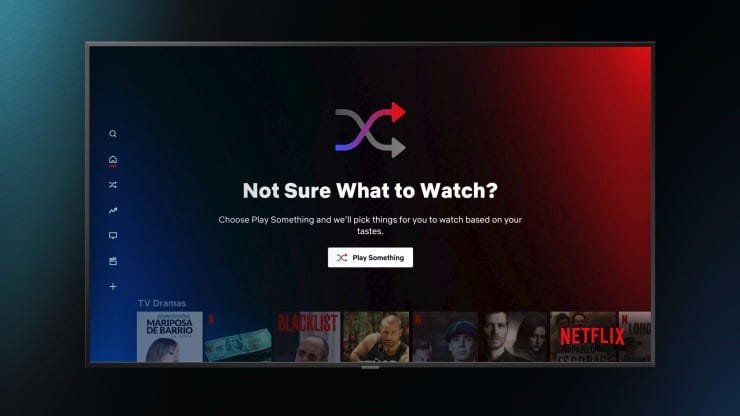
This is facilitated through the implementation of online A/B tests, which gauge user reactions and measure satisfaction metrics over the long term. These experimental endeavors yield not only quantitative results but also novel perspectives that contribute to the ongoing enhancement of both research and product offerings.
The company has extended its horizons to encompass personalized ranking, page generation, search optimization, image selection, messaging effectiveness, and various other dimensions. By leveraging these sophisticated approaches, Netflix remains at the forefront of technological innovation in the realm of content recommendation, ensuring that users experience the most tailored and enjoyable entertainment journey possible.
Global Localization:
Global localization is a critical aspect of Netflix’s marketing strategy aimed at expanding its customer base worldwide while ensuring cultural sensitivity and relevance.
To accommodate diverse linguistic and cultural backgrounds, Netflix offers customized interfaces, subtitles/captions, and audio dubbing options for each region. Users can switch between languages seamlessly, providing a personalized viewing experience that caters to individual preferences.
Global localization involves adapting content according to regional norms and values. This includes editing or altering scenes, dialogue, or visual elements to align with local contexts and minimize cultural misinterpretations or offense. Such measures help create a welcoming environment for users around the globe.
Acquiring exclusive rights to locally produced TV series and films is another vital component of Netflix’s global localization strategy. These titles not only broaden the platform’s offerings but also increase its appeal to specific regions. For instance, obtaining Korean dramas and Japanese anime strengthens Netflix’s presence in Asia.
Partnering with indigenous filmmakers, writers, and directors fosters a deep understanding of local cultures and trends. Supporting emerging artists creates opportunities for fresh perspectives and innovative stories that resonate with regional audiences.
By tailoring content and services to distinct markets, Netflix differentiates itself from competitors struggling to achieve similar levels of localization. Offering a comprehensive range of localized content positions Netflix favorably against other streamers vying for global dominance.
Content Teasers and Countdowns:
Creating buzz around upcoming releases is a crucial part of Netflix’s marketing playbook. The company strategically employs content teasers, trailers, and countdowns to generate excitement and anticipation. By giving viewers a taste of what’s to come and building anticipation, Netflix turns a simple release into an event, driving higher viewership and subscriber engagement.
Social Media Engagement:
What makes Netflix stand out on social media is their knack for connecting with their audience and building a sense of community. They achieve this by sharing behind-the-scenes insights, interactive posts, and interacting with fans.
Their prowess in this area has garnered them a massive following across various social media platforms, such as:
- Instagram: 33 million followers
- Facebook: 89 million followers
- Twitter (Now X): 22 million followers
- LinkedIn: 10.2 million followers
- TikTok: 31.9 million followers
- YouTube: 26.9 million followers
- Reddit: 152.5k followers
Additionally, Netflix maintains other social media accounts that collectively amass millions of followers. For instance:
- Netflix India: 8.2 million followers
- Netflix UK and Ireland: 2.9 million followers
- Netflix Canada: 1 million followers
- Netflix Japan: 500k followers
But how did they achieve such impressive numbers?
Trying Different Content Styles
Netflix consistently experiments with various content styles on social media to engage their audience and cultivate a dedicated following.
They achieve this by diversifying the types of media they share, including images, short clips, and reels. For instance, they might offer glimpses behind the scenes of their shows and movies on Instagram or use TikTok to create brief, visually captivating videos that showcase their content in an entertaining manner.
Connecting with the Audience
Beyond their content experiments, Netflix places great importance on generating relatable and human content.
They accomplish this by offering personal insights into their shows and movies, interacting with their followers, and encouraging discussions and feedback.
This approach fosters a personal bond with their audience and imparts a sense of relatability and humanity to their social media presence.
They actively respond to their followers, even from their sub-accounts, enhancing the pleasure of following their content. For instance, they retweet content linked to the series and movies on their platform.
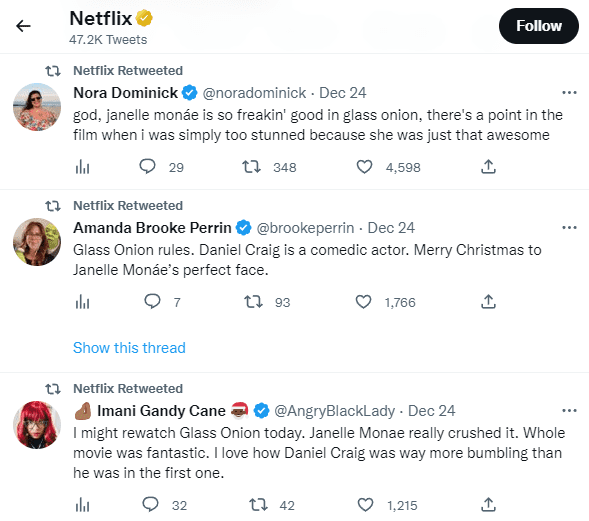
Crafting Trending Content
Netflix is known for crafting trending content on social media, including memes and reels that incorporate popular audio tracks, boosting the visibility of their content.
To achieve this, they stay attuned to current trends and integrate them into their content. For instance, they may create a meme referencing a popular series or produce a reel featuring a trending audio track on Instagram.
Recently, they shared famous lines from their hit show “Bridgerton” and their newly released movie “The Recruit,” amassing over 100k likes and numerous comments.

Sharing Their Latest Releases
Netflix often shares news about their latest releases and upcoming shows and movies to build anticipation among their audience. This strategy generates significant engagement and encourages sharing across platforms, ultimately driving conversions.
Creating Relatable Content
Netflix tailors their social media strategy to resonate with their largely millennial and gen-z audience. This involves not only crafting humorous memes and engaging content but also updating their bio with memorable lines from their top-performing shows.

Netflix has undoubtedly perfected its social media approach on every platform. Whether it’s Twitter, Instagram, or TikTok, they’ve managed to effectively connect with their audience and cultivate a feeling of togetherness.
Trial Periods and Flexible Subscription Plans:
Trial periods and flexible subscription plans are two of Netflix’s most successful marketing strategies.
Free trial: Netflix offers a free trial of its service for new users. This allows people to try the service before they commit to a subscription. The free trial is typically 7 days long, but it can vary depending on the country.
Flexible subscription plans: Netflix offers a variety of subscription plans, so users can choose the plan that best suits their needs. The plans differ in price and the number of screens that can be used simultaneously. For example, the Basic plan costs $9.99 per month and allows one screen to be used at a time. The Premium plan costs $19.99 per month and allows four screens to be used simultaneously.
Trial periods and flexible subscription plans are effective marketing strategies because they allow people to try Netflix before they commit to a subscription. This reduces the risk of people subscribing and then cancelling their subscription shortly afterwards. Trial periods also help Netflix to attract new subscribers, as people are more likely to sign up for a free trial than they are to pay for a subscription upfront.
New Business Model (Ad-Supported)
Due to losses in its susbcriber base recorded in the first half of 2022, Netflix introduced an ad-supported tier in November 2022 to offset customer and revenue declines. Indeed, a survey from October 2022 showed that one third of U.S. Netflix subscribers would likely switch to the ad-supported tier. Furthermore, while the subscription revenue of the streaming provider is expected to decline in the years to come, the advertising revenue is forecast to increase, showing the high value of hybrid business models to the streaming market these days.
Basic with Ads costs $6.99 a month and is available in Australia, Brazil, Canada, France, Germany, Italy, Japan, Korea, Mexico, Spain, the UK and the US.
Content Variety and Continuous Updates:
Netflix employs a strategic marketing approach centered around the pillars of content variety and consistent updates. This strategy has contributed significantly to their success in the entertainment industry. By offering a diverse range of content across genres and formats and ensuring a continuous stream of new releases, Netflix effectively captures and retains audience attention.
Rather than relying on a singular type of content, Netflix has embraced a multiplicity of genres, including drama, comedy, sci-fi, and documentaries. This wide array of options caters to a broad spectrum of viewer preferences, ensuring that there is always something appealing for every member of their global audience.
In addition to content diversity, Netflix maintains a steady flow of updates, releasing new shows, movies, and original productions regularly. This practice not only keeps subscribers engaged and excited but also reinforces the perception of Netflix as a dynamic and innovative platform.
By intertwining content variety with a commitment to continuous updates, Netflix capitalizes on the evolving nature of audience interests and consumption habits. This approach has enabled them to forge a strong bond with viewers and stay at the forefront of the streaming industry.
Innovative Partnerships and Collaborations:
Netflix is known for forming innovative partnerships and collaborations to expand its reach and enhance its services. Some notable examples include:
Disney collaboration (now ended): In December 2019, Netflix announced an agreement with The Walt Disney Company to license certain pay TV rights for its movies and TV shows globally. This deal allowed Netflix to distribute Disney content outside China until January 2026. However, now that Disney+ exists, Disney pulled all its content from Netflix.
Sky UK acquisition: In September 2018, Comcast acquired Sky UK, giving Netflix ownership of Europe’s largest broadcaster. This move strengthened Netflix’s presence in international markets and provided valuable insights into European consumer behavior.
NFLX Labs: Launched in 2017, NFLX Labs is a research group within Netflix dedicated to exploring emerging technologies like artificial intelligence, computer vision, and natural language processing. These advancements help improve the overall Netflix experience by enhancing recommendation systems, voice control capabilities, and other features.
Amazon Studios acquisition: In April 2018, Amazon agreed to sell its stake in the joint venture studio, which was formed in 2013 to produce original content exclusively for Prime Video. As part of the deal, Netflix gained access to former Amazon employees working on various projects.
DreamWorks Animation acquisition: In August 2016, Neflix purchased DreamWorks Animation for $3.8 billion, significantly bolstering its children’s and family content portfolio. This purchase also expanded Netflix’s global reach through DreamWorks’ existing distribution network.
Milli Vanilli acquisition: In May 2019, Netflix signed a multiyear deal with German pop duo Milli Vanilli to develop scripted and unscripted projects featuring the pair. While unexpected, this collaboration highlights Netflix’s willingness to consider unique opportunities beyond traditional Hollywood players.
Additionally, Netflix has partnered with several production companies worldwide, such as Media Rights Capital (MRC) and Gaumont International Television, to co-produce popular series like “Ozark,” “Narcos,” and “House of Cards.”
Netflix’s partnership strategy enables them to diversify their content catalog while minimizing risk associated with producing original programming alone. By leveraging external expertise and resources, Netflix can create high-quality content quickly and efficiently without sacrificing quality standards.
Netflix excels at identifying and capitalizing on innovative partnerships and collaborations to achieve business objectives. Whether acquiring established studios or signing agreements with less conventional entities, these alliances allow Netflix to remain competitive in today’s rapidly evolving media landscape.
In conclusion, Netflix’s marketing strategies exemplify a fusion of innovation, personalization, and adaptability. By harnessing the power of original content, data-driven insights, and interactive engagement, Netflix has not only redefined the entertainment landscape but also created a blueprint for success in the digital age. As the streaming industry continues to evolve, Netflix’s marketing strategies will undoubtedly continue to shape the way we consume content.
Also Read: The Evolution of Netflix: Power of Innovation in the Streaming Era
To read more content like this, subscribe to our newsletter

